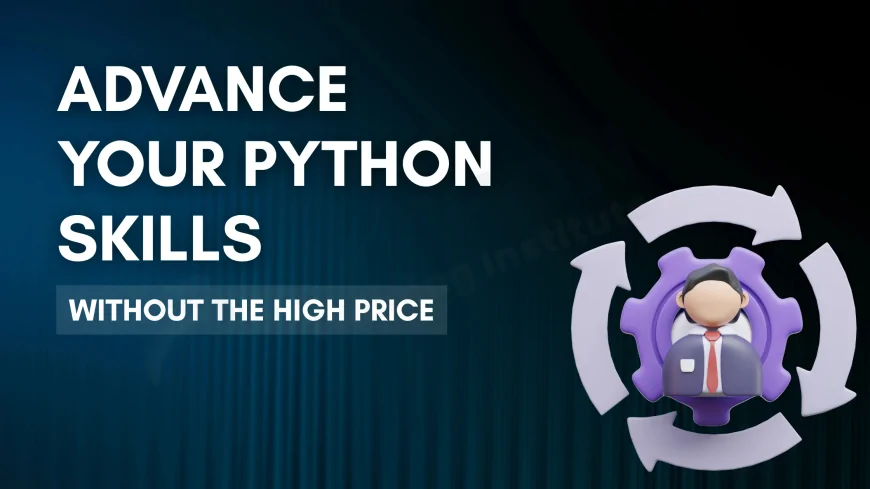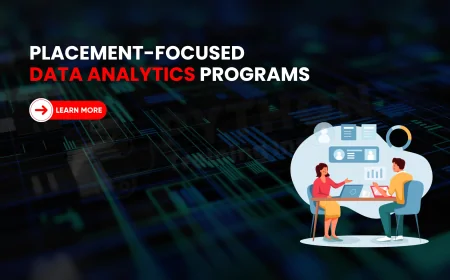Affordable Advanced Python Programming Courses for Career Growth
advanced python courses, affordable python programming, python training Pune, advanced python tutorials, python course for developers, learn advanced python cheap, python automation course, advanced python programming, object-oriented python course, affordable coding courses

Python is the backbone of modern programming—widely used in everything from web development and automation to artificial intelligence and data science. Once you've conquered the basics of Python, the logical next step is to explore advanced concepts that unlock the true potential of the language. However, affordability becomes a key concern for many learners who don’t want to invest heavily in premium bootcamps or traditional institutions.
Fortunately, you don’t need to spend thousands of dollars to get top-tier training. There are affordable advanced Python courses available that are budget-friendly, comprehensive, and hands-on.
In this blog, we’ll guide you through:
-
What defines an advanced Python course
-
Key topics you should master
-
What to look for in an affordable course
-
Free vs. low-cost course comparison
-
How to self-evaluate your readiness
-
How to stay accountable while learning
-
Why cost doesn't always equal quality
-
Pitfalls to avoid in cheap courses
Let’s explore the path to mastering Python without draining your bank account.
Who Needs Advanced Python Courses?
Before diving in, let’s clarify who would benefit most from an advanced Python course.
You’re ready for advanced material if you:
-
Understand Python syntax and logic fluently
-
Have built basic projects or applications
-
Know how to work with functions, loops, classes, and file handling
-
Want to move beyond scripting into full-scale application development, automation, or data science
If these resonate, then an advanced course is your next step.
What Does "Advanced Python" Actually Mean?
“Advanced” doesn’t mean complex for the sake of being difficult. It means pushing the boundaries of what Python can do. Here are core concepts usually included in advanced-level courses:
| Core Area | Key Concepts |
|---|---|
| Object-Oriented Programming | Advanced use of classes, inheritance, polymorphism, encapsulation |
| Functional Programming | Lambda functions, map(), filter(), reduce(), closures, decorators |
| Exception Handling | Custom exceptions, context managers, best practices |
| Iterators & Generators | Creating custom iterables, lazy evaluation, performance enhancement |
| Modules & Packaging | Creating, importing, and distributing reusable code |
| File Handling & I/O | Working with JSON, CSV, binary, and more advanced I/O strategies |
| Concurrency & Parallelism | Threads, multiprocessing, asyncio |
| Performance Optimization | Profiling, memory management, algorithmic efficiency |
| Testing & Debugging | Unit testing, test-driven development (TDD), debugging techniques |
| Working with APIs | REST APIs, authentication, rate-limiting, web requests |
| Advanced Libraries | NumPy, Pandas, Requests, BeautifulSoup, SQLAlchemy, etc. |
How to Evaluate a "Good and Affordable" Course
Affordability is relative, but let’s say anything under $50 qualifies as budget-friendly. Some courses are even free. But price alone isn't enough. You should evaluate each course across six criteria:
| Criteria | What to Look For |
|---|---|
| Depth of Content | Does it go beyond syntax and offer real-world application? |
| Instructor Expertise | Does the teacher have practical experience, not just theory? |
| Student Feedback | Reviews and testimonials on clarity, usefulness, engagement |
| Practical Assignments | Projects, code challenges, or mini-apps to reinforce learning |
| Code Reviews & Solutions | Are solutions explained? Can you compare your code? |
| Lifetime Access / Updates | Are materials updated regularly and available long-term? |
Where to Find Affordable Courses
To stay neutral and not mention institutions, here’s how to identify affordable advanced Python content across platforms:
-
Marketplace-based platforms: Look for Python categories with high ratings (4.5+ stars), long durations (10+ hours), and multiple modules on topics like multiprocessing, OOP, and performance optimization.
-
MOOC-style learning hubs: Filter by “Advanced Python,” sort by price (low to high), and choose those with peer-reviewed feedback.
-
Independent developer blogs & GitHub projects: Many developers offer affordable courses linked through personal websites or repositories.
-
Open source or community-maintained courses: These often have Patreon-backed content or offer PDFs/slides at low cost.
Top Course Features to Look for (Beyond Content)
Advanced Python courses that go beyond lecture videos can supercharge your learning:
-
Capstone Projects: Building something real—a web scraper, CLI tool, or API server.
-
Quizzes/Code Exercises: Timed challenges and code assignments test your skills.
-
Discussion Boards/Forums: Where learners interact and share solutions.
-
Git Integration: Learn to use version control and share your project portfolio.
-
Hands-On Debugging: Courses that walk through bugs and troubleshooting offer critical skills.
Case Study: Self-Taught Learner Using Affordable Courses
Meet Alex, a marketing analyst with basic Python knowledge. He had written simple scripts to automate Excel reports but wanted to shift to data engineering.
Rather than enroll in a $3000 bootcamp, he found two high-rated advanced Python courses for $35 total. One focused on OOP and design patterns; the other specialized in APIs and concurrency.
After 6 months of part-time study, 5 portfolio projects, and regular posts on GitHub and LinkedIn, Alex landed an entry-level data engineering job.
The takeaway? Affordable doesn’t mean ineffective.
Accountability Tips for Self-Paced Courses
-
Join Learning Groups: Use public forums or Discord servers to stay on track.
-
Set Weekly Goals: Break content into 1–2 hour sessions, and stick to it.
-
Blog About It: Document your progress on Medium, LinkedIn, or your personal blog.
-
GitHub Portfolio: Share your course projects. Recruiters love proof-of-work.
-
Teach Others: Explaining topics helps retain them better.
Affordable Learning, Real-World Skills
It’s easy to assume you need elite credentials to master advanced programming—but what you really need is:
-
High-quality instruction
-
Consistent practice
-
Real-world projects
-
Curiosity to explore
Affordable courses often meet all these criteria when chosen wisely. They may not come with prestigious logos, but they offer the same knowledge and arguably more motivation.
Common Pitfalls in Cheap or Free Courses
-
Lack of Depth: Some “advanced” courses just rehash basics.
-
No Real Projects: Without hands-on tasks, theory doesn’t stick.
-
No Feedback: No way to check if you’re applying concepts correctly.
-
Outdated Content: Python evolves; stale content can teach bad habits.
-
Overpromise, Underdeliver: Buzzword-filled titles with shallow content.
Pro tip: Read full course outlines before enrolling. Look for examples, sample lectures, and instructor background.
What Real “Learning” Looks Like in Advanced Python
-
You don’t just learn decorators; you use them to enforce access controls.
-
You don’t just hear about threading; you build concurrent downloaders.
-
You don’t just study REST APIs; you create and consume them securely.
-
You don’t just look at OOP; you refactor messy procedural code into clean object hierarchies.
Bonus: Sample Curriculum for an Ideal Affordable Advanced Python Course
| Module | Topics Covered | Format |
|---|---|---|
| 1 | Review of Core Python: Functions, Classes, and Data Structures | Video + Quiz |
| 2 | Advanced OOP: Inheritance, Dunder Methods, Design Patterns | Code-Along Projects |
| 3 | Functional Programming: Lambdas, Closures, Decorators | Interactive Coding |
| 4 | Working with APIs: HTTP, REST, Auth, JSON | API Integration Project |
| 5 | Multithreading & Asyncio: Speed Up Code | Performance Lab |
| 6 | Testing: Unit Tests, Pytest, Mocking | Assignments |
| 7 | Packaging: Creating Reusable Modules and CLI Tools | Final Capstone Project |
You can often find all of this content packaged in courses under $40 if you search diligently and read reviews.
FAQ's
1. What are the best affordable advanced Python courses in Pune?
You can find several training centers in Pune offering advanced Python courses at budget-friendly prices. Look for programs that cover object-oriented programming, data structures, APIs, and automation tools, along with hands-on project work.
2. How long does it take to complete an advanced Python course in Pune?
Most affordable advanced Python courses in Pune last between 4 to 8 weeks. The duration depends on class frequency and content depth. Weekend and weekday batches are usually available for flexibility.
3. What topics are covered in an advanced Python course?
Topics include object-oriented programming, decorators, multithreading, API integration, error handling, testing, database connectivity, and performance optimization. Some courses also introduce frameworks like Flask or Django for real-world application.
4. Can I get a job after completing an advanced Python course in Pune?
Yes. Pune’s tech industry actively seeks Python developers. Completing an advanced course boosts your resume, especially when paired with practical projects, GitHub work, and a solid understanding of real-world problem-solving.
5. Are these courses suitable for working professionals?
Absolutely. Many Python courses in Pune offer evening or weekend batches to accommodate working professionals. These flexible options help you upskill without affecting your job schedule.
6. What is the average cost of an advanced Python course in Pune?
The average fee for an advanced Python course in Pune ranges from ₹5,000 to ₹15,000, depending on course depth, trainer expertise, and duration. Some institutes also offer EMI options.
7. Do these courses provide a certificate?
Yes. Most affordable Python training programs in Pune provide completion certificates. While not equivalent to global certifications, they are valuable for showcasing your skill level to employers.
8. Are advanced Python courses in Pune beginner-friendly?
Advanced courses assume a basic understanding of Python syntax and programming logic. Beginners are advised to complete a foundational course before enrolling in an advanced-level program.
9. What career roles can I apply for after an advanced Python course?
Post-training, you can explore roles like Python Developer, Automation Engineer, Backend Developer, Data Analyst, and Scripting Specialist. These roles are common in Pune’s growing IT ecosystem.
10. Do I need a degree to join an advanced Python course?
No. These courses are open to anyone with basic Python knowledge, regardless of educational background. Skills and practical experience matter more than formal degrees in most programming jobs.
11. How is an advanced course different from a beginner course?
Advanced courses go beyond basic syntax. They focus on solving complex problems, writing efficient code, using external libraries, working with APIs, and understanding how Python works under the hood.
12. Is job placement assistance provided in Pune-based Python courses?
Many training centers in Pune offer job assistance through resume reviews, interview preparation, and company referrals. However, success depends on your performance and project portfolio.
13. Can I attend these courses online if I live outside Pune?
Yes. Most institutes offer online batches via live or recorded sessions. This makes it easy for students outside Pune or working remotely to access the same quality training at affordable rates.
14. How can I judge the quality of an affordable Python course?
Check for trainer experience, student reviews, hands-on projects, updated curriculum, and clear learning outcomes. Course previews or demo classes are often available to help you decide.
15. Are there any real-world projects in the course?
Good Python training programs include capstone or real-world projects like building web apps, automating reports, or working with APIs. These help build your portfolio and show job readiness.
16. How important are Python certifications for getting hired?
While not mandatory, certifications can strengthen your profile, especially when combined with real project work. They demonstrate your commitment to learning and provide structured evidence of your skills.
17. Do Python courses in Pune teach frameworks like Flask or Django?
Many advanced courses offer optional modules or separate classes on web frameworks such as Flask or Django. These tools are crucial for building production-level web applications.
18. What kind of Python projects are included in the course?
Typical projects include web scraping apps, task automation tools, data visualizations, REST API services, and small-scale web platforms using Flask or similar frameworks.
19. Is learning advanced Python enough to become a full-stack developer?
Learning advanced Python is a great start, especially for backend development. However, full-stack development also requires frontend skills in JavaScript, HTML/CSS, and database management.
20. Can I freelance after completing an advanced Python course?
Yes. Python is widely used in freelance gigs—from automating business tasks to building web tools. With a strong portfolio and clear skill set, you can start taking freelance projects confidently.
Your Success Doesn’t Depend on Price
In Python—as in life—how you use what you learn matters more than where you learned it or how much you paid. With dedication, smart resource selection, and consistent coding practice, affordable advanced Python courses can elevate you to a professional level.
Don't let a limited budget stop your growth. Learn smart, build consistently, and your portfolio will speak louder than any diploma.
What's Your Reaction?
 Like
0
Like
0
 Dislike
0
Dislike
0
 Love
0
Love
0
 Funny
0
Funny
0
 Angry
0
Angry
0
 Sad
0
Sad
0
 Wow
0
Wow
0














